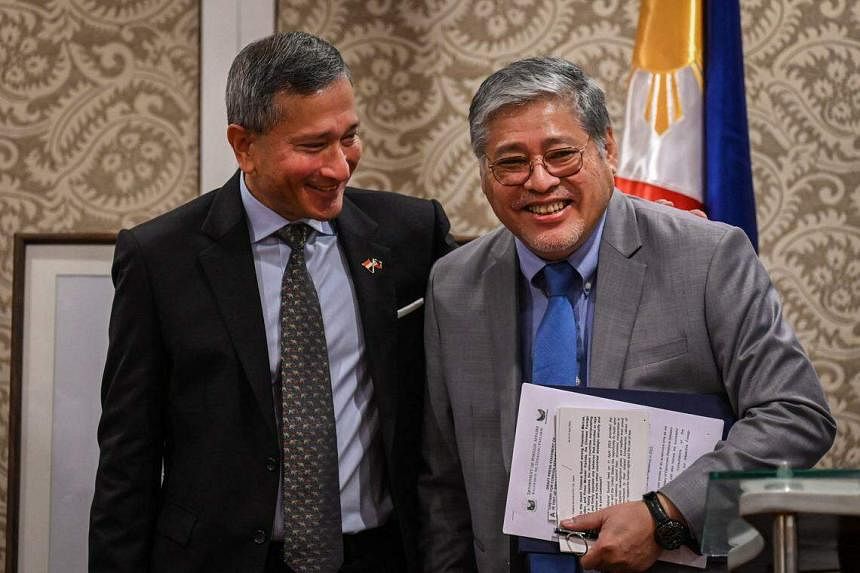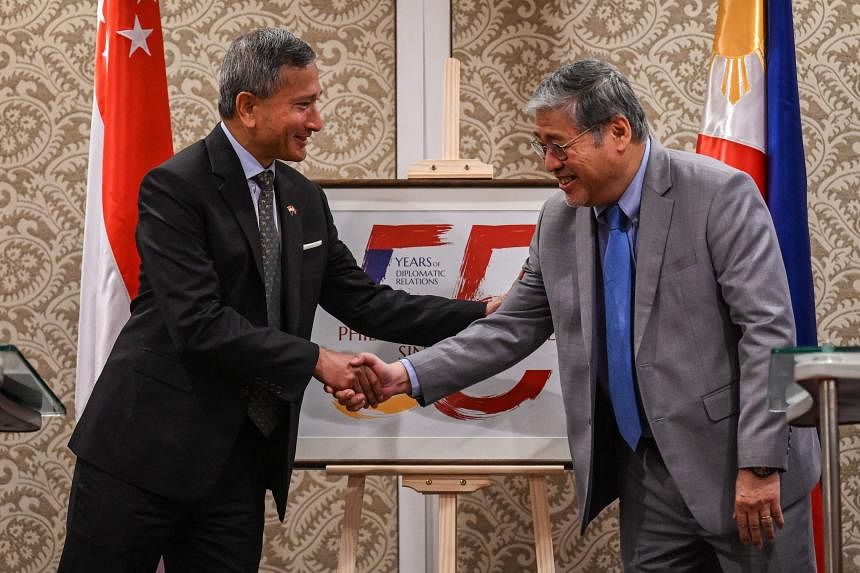MANILA - Foreign Minister Vivian Balakrishnan said Singapore hopes to see claimants in the South China Sea settle the dispute peacefully, adding that Asean nations may differ in their approach to the issue but remain united in seeking peace in the region.
He was speaking at a joint press briefing with his Filipino counterpart Enrique Manalo during a four-day visit to the Philippines that started on April 15, kicking off the commemoration of 55 years of diplomatic ties in 2024. Singapore and the Philippines are founding members of Asean.
Asked by a reporter about the need for a united Asean voice on the South China Sea issue, Dr Balakrishnan said member states seek peace and stability in one of the world’s busiest waterways.
While not all Asean countries are claimants in the South China Sea, it does not mean Asean as a whole does not have a stake in what happens in the dispute, he said.
“Asean is united in the sense that no single Asean country wants to become a proxy, or a vassal state of any power. So, you need to be able to deal with this variety, internally, as well as the diversity of our approaches externally, but still recognise that we want to maintain unity, cohesion and centrality of Asean,” he said.
While Singapore has no claims in the disputed waterway, any escalation of tensions could impede trade, increase insurance premiums and have an inflationary impact on economies in the region, he added.
Dr Balakrishnan said concerned parties should resolve the dispute peacefully, adding that the UN Convention on the Law of the Sea already sets a comprehensive international legal framework to settle issues over the disputed waterway.
“Singapore has to believe in the importance of the international rule of law. If it is just the law of the jungle, where the powerful do what they will and the weak must suffer what they must, then the future will be bleak for Singapore and the Philippines,” he said.
The key concern over the South China Sea comes after Beijing’s numerous clashes since 2023 with the Philippines near the Second Thomas Shoal, which is claimed by both countries. These include a clash on March 23, in which China’s coast guard allegedly fired water cannon at one of Manila’s supply boats.
Beijing has claimed almost the entire South China Sea, but the nine-dash line accompanying its claim and its land reclamation activities in the contested waters were regarded as unlawful by an international court in 2016 in a case filed by the Philippines.
Four Asean nations – the Philippines, Brunei, Malaysia and Vietnam – along with Taiwan have rival claims to parts of the South China Sea.
Dr Balakrishnan met Philippine President Ferdinand Marcos Jr on April 15 before meeting Vice-President Sara Duterte the next day. He also met Mr Manalo on April 16 to discuss issues of mutual concern, including the South China Sea and the establishment of a carbon credit market between the two countries.
At the press briefing, Dr Balakrishnan said a carbon credit market would open up new growth areas and opportunities for the Philippine economy while expanding Singapore businesses’ access to the available carbon credits that would be generated.
The two foreign ministers also discussed energy collaboration.
Referring to Laos by its official name, Dr Balakrishnan said the Lao PDR-Thailand-Malaysia-Singapore Power Integration Project shows that it is possible to have cross-border energy trade cooperation among Asean countries.
“In this part of the world, the connection between the Philippines, Indonesia, Malaysia and Brunei is another critical pillar. And if you put these two networks together, you, in fact, get the beginning of a very significant Asean power grid,” he said.
He noted that the Philippines is chair of the Asean Power Grid Consultative Committee, adding that “we look forward to working closely with the Philippines to make the Asean power grid a reality”.
The two foreign ministers also discussed security concerns in the Middle East, with both calling for the de-escalation of tensions in the Gaza Strip. They talked about Iran’s recent missile attack on Israel and its possible implications on South-east Asia.
“These escalations pose significant danger to a regional conflagration, which ultimately will also impact all of us here in South-east Asia. So we hope for the best,” Dr Balakrishnan said.
Asked by a reporter about the upcoming leadership change in Singapore, he said: “I do not expect any change in foreign policy and in our contributions to Asean.”
Dr Balakrishnan added that he believes Singapore’s ongoing projects and investments in the Philippines will continue.

Mr Manalo said Singapore and the Philippines have a “strong, robust and dynamic relationship”, highlighting that the Republic was Manila’s eighth-largest trading partner in 2023. Singapore is also the Philippines’ sixth-largest export market and seventh-largest import source.
Key Singapore investments in the Philippines include SIA Engineering’s maintenance, repair and overhaul facility at a free port zone in Clark, Pampanga, a province 95km north of Manila, and Changi Airports International’s stake in the consortium handling the 25-year concession to operate Clark International Airport.
In a statement on April 16, Singapore’s Ministry of Foreign Affairs said that Dr Balakrishnan and Mr Manalo “had a fruitful discussion on ways for both countries to further expand bilateral cooperation, especially in the areas of people-to-people ties, carbon credits, renewable energy and the Asean Power Grid”.
“They also engaged in a wide-ranging and candid discussion on regional and international developments. They emphasised the importance of strengthening Asean Centrality and unity, and upholding a rules-based international order to promote peace and stability in the region,” the MFA added.


